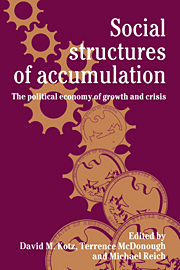Book contents
- Frontmatter
- Contents
- List of contributors
- Introduction
- Part I The theory of social structures of accumulation
- Part II History, institutions, and macroeconomic analysis
- 6 The construction of social structures of accumulation in US history
- 7 The financial system and the social structure of accumulation
- 8 Alternative social structure of accumulation approaches to the analysis of capitalist booms and crises
- 9 The politics of the US industrial policy debate, 1981–1984 (with a note on Bill Clinton's “industrial policy”)
- Part III Class, race, and gender
- Part IV The international dimension
- Afterword: New international institutions and renewed world economic expansion
- Comprehensive bibliography on the SSA approach
- Index
8 - Alternative social structure of accumulation approaches to the analysis of capitalist booms and crises
Published online by Cambridge University Press: 08 October 2009
- Frontmatter
- Contents
- List of contributors
- Introduction
- Part I The theory of social structures of accumulation
- Part II History, institutions, and macroeconomic analysis
- 6 The construction of social structures of accumulation in US history
- 7 The financial system and the social structure of accumulation
- 8 Alternative social structure of accumulation approaches to the analysis of capitalist booms and crises
- 9 The politics of the US industrial policy debate, 1981–1984 (with a note on Bill Clinton's “industrial policy”)
- Part III Class, race, and gender
- Part IV The international dimension
- Afterword: New international institutions and renewed world economic expansion
- Comprehensive bibliography on the SSA approach
- Index
Summary
My primary purpose in this chapter is to explore the theoretical foundations of alternative social structure of accumulation (SSA) approaches to the analysis of booms and crises in advanced capitalist economies. A secondary purpose is to consider some of the strengths and limitations of the particular type of SSA theory that Samuel Bowles, David M. Gordon, and I have applied in our own work on the post-World War II United States economy.
In the first part of this chapter I formulate simplified models of two quite different SSA-based theories of capitalist accumulation and crisis – one based on the kind of “neo-Marxian” analysis that Bowles, Gordon, and I have helped to develop, and the other based on an alternative kind of “neo-Keynesian” analysis that reflects work that has been done by other non-neoclassical political economists working on the same range of issues. In the second part I compare and contrast the neo-Marxian and neo-Keynesian models and discuss how each of them can be embedded in an SSA framework. In the final part, I discuss our SSA-based neo-Marxian analysis of the postwar boom and crisis in the US economy in the light of the comparative theoretical issues raised in the first two parts of the chapter.
Modeling alternative SSA theories of boom and crisis
The concept of an SSA was developed as part of an approach to analyzing successive booms and crises in capitalist economies (see Gordon [1978] and Gordon et al. [1982]).
- Type
- Chapter
- Information
- Social Structures of AccumulationThe Political Economy of Growth and Crisis, pp. 146 - 172Publisher: Cambridge University PressPrint publication year: 1994



